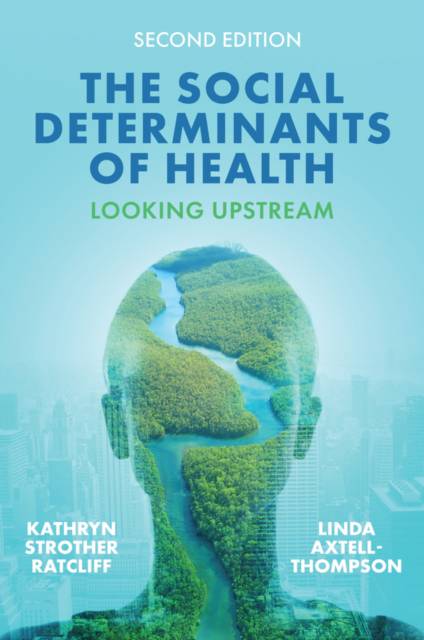
- Afhalen na 1 uur in een winkel met voorraad
- Gratis thuislevering in België vanaf € 30
- Ruim aanbod met 7 miljoen producten
- Afhalen na 1 uur in een winkel met voorraad
- Gratis thuislevering in België vanaf € 30
- Ruim aanbod met 7 miljoen producten
Zoeken
The Social Determinants of Health
Looking Upstream
Kathryn Strother Ratcliff, Linda Axtell-Thompson
Hardcover | Engels
€ 103,45
+ 206 punten
Uitvoering
Omschrijving
The new edition of this popular and timely introduction takes seriously the idea that health outcomes can only be fully understood by investigating the role the social world plays in our health.
Kathryn Strother Ratcliff and Linda Axtell-Thompson put into practice the "upstream" imagery championed by public health experts, locating the causes of health problems - and their solutions - within the social environment. Each chapter explains how the shape of social institutions, the unequal realities of community life, and the politics behind corporate and governmental decisions produce and perpetuate unhealthy living and working conditions. This new edition brings the discussion up to date, linking it more strongly to existing US and international policy frameworks on the determinants of health, and pays greater attention to socioeconomic factors, education, climate change, and neighborhood disparities.
Arguing that none of us should be placed in health-threatening situations that could be prevented, Ratcliff and Axtell-Thompson's provocative analysis uses social justice and human rights lenses to guide public discussion toward changes that can produce a healthier world for us all. The material in this book will continue to be invaluable to professionals and students in sociology, public health, and other fields related to health.
Kathryn Strother Ratcliff and Linda Axtell-Thompson put into practice the "upstream" imagery championed by public health experts, locating the causes of health problems - and their solutions - within the social environment. Each chapter explains how the shape of social institutions, the unequal realities of community life, and the politics behind corporate and governmental decisions produce and perpetuate unhealthy living and working conditions. This new edition brings the discussion up to date, linking it more strongly to existing US and international policy frameworks on the determinants of health, and pays greater attention to socioeconomic factors, education, climate change, and neighborhood disparities.
Arguing that none of us should be placed in health-threatening situations that could be prevented, Ratcliff and Axtell-Thompson's provocative analysis uses social justice and human rights lenses to guide public discussion toward changes that can produce a healthier world for us all. The material in this book will continue to be invaluable to professionals and students in sociology, public health, and other fields related to health.
Specificaties
Betrokkenen
- Auteur(s):
- Uitgeverij:
Inhoud
- Aantal bladzijden:
- 270
- Taal:
- Engels
Eigenschappen
- Productcode (EAN):
- 9781509565573
- Verschijningsdatum:
- 15/12/2025
- Uitvoering:
- Hardcover
- Formaat:
- Genaaid

Alleen bij Standaard Boekhandel
+ 206 punten op je klantenkaart van Standaard Boekhandel
Beoordelingen
We publiceren alleen reviews die voldoen aan de voorwaarden voor reviews. Bekijk onze voorwaarden voor reviews.











